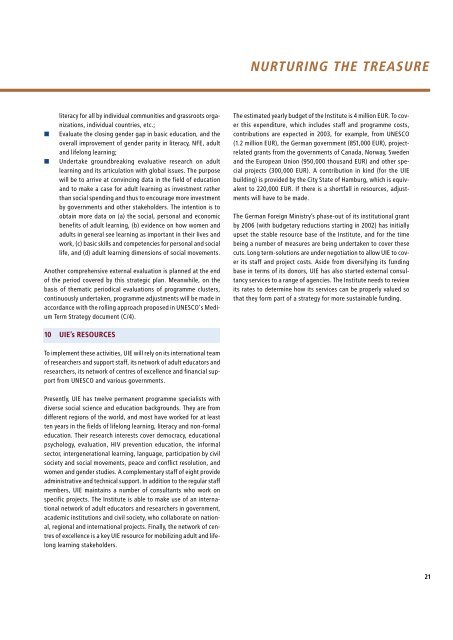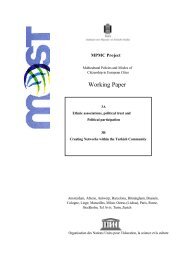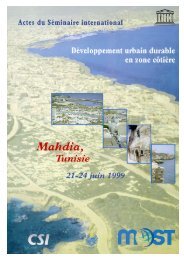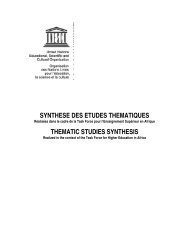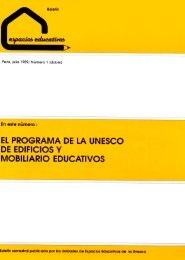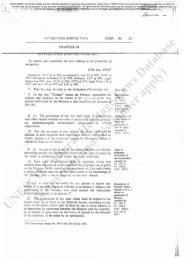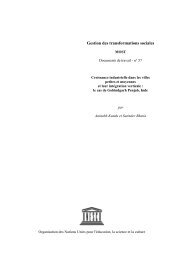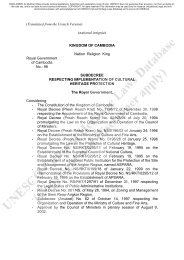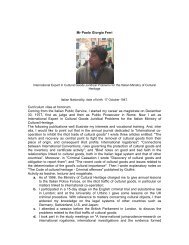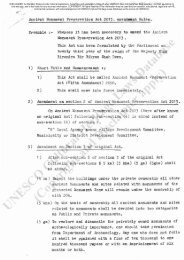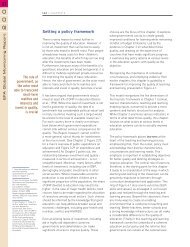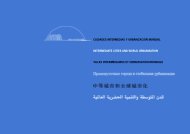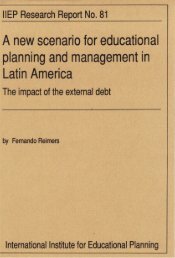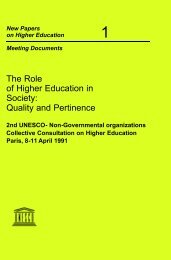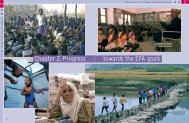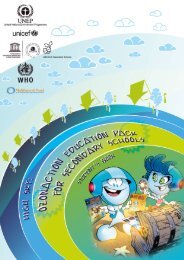NURTURING THE TREASURE NURTURING THE ... - Unesco
NURTURING THE TREASURE NURTURING THE ... - Unesco
NURTURING THE TREASURE NURTURING THE ... - Unesco
Create successful ePaper yourself
Turn your PDF publications into a flip-book with our unique Google optimized e-Paper software.
<strong>NURTURING</strong> <strong>THE</strong> <strong>TREASURE</strong><br />
■<br />
■<br />
literacy for all by individual communities and grassroots organizations,<br />
individual countries, etc.;<br />
Evaluate the closing gender gap in basic education, and the<br />
overall improvement of gender parity in literacy, NFE, adult<br />
and lifelong learning;<br />
Undertake groundbreaking evaluative research on adult<br />
learning and its articulation with global issues. The purpose<br />
will be to arrive at convincing data in the field of education<br />
and to make a case for adult learning as investment rather<br />
than social spending and thus to encourage more investment<br />
by governments and other stakeholders. The intention is to<br />
obtain more data on (a) the social, personal and economic<br />
benefits of adult learning, (b) evidence on how women and<br />
adults in general see learning as important in their lives and<br />
work, (c) basic skills and competencies for personal and social<br />
life, and (d) adult learning dimensions of social movements.<br />
Another comprehensive external evaluation is planned at the end<br />
of the period covered by this strategic plan. Meanwhile, on the<br />
basis of thematic periodical evaluations of programme clusters,<br />
continuously undertaken, programme adjustments will be made in<br />
accordance with the rolling approach proposed in UNESCO's Medium<br />
Term Strategy document (C/4).<br />
The estimated yearly budget of the Institute is 4 million EUR. To cover<br />
this expenditure, which includes staff and programme costs,<br />
contributions are expected in 2003, for example, from UNESCO<br />
(1.2 million EUR), the German government (851,000 EUR), projectrelated<br />
grants from the governments of Canada, Norway, Sweden<br />
and the European Union (950,000 thousand EUR) and other special<br />
projects (300,000 EUR). A contribution in kind (for the UIE<br />
building) is provided by the City State of Hamburg, which is equivalent<br />
to 220,000 EUR. If there is a shortfall in resources, adjustments<br />
will have to be made.<br />
The German Foreign Ministry’s phase-out of its institutional grant<br />
by 2006 (with budgetary reductions starting in 2002) has initially<br />
upset the stable resource base of the Institute, and for the time<br />
being a number of measures are being undertaken to cover these<br />
cuts. Long term-solutions are under negotiation to allow UIE to cover<br />
its staff and project costs. Aside from diversifying its funding<br />
base in terms of its donors, UIE has also started external consultancy<br />
services to a range of agencies. The Institute needs to review<br />
its rates to determine how its services can be properly valued so<br />
that they form part of a strategy for more sustainable funding.<br />
10 UIE’s RESOURCES<br />
To implement these activities, UIE will rely on its international team<br />
of researchers and support staff, its network of adult educators and<br />
researchers, its network of centres of excellence and financial support<br />
from UNESCO and various governments.<br />
Presently, UIE has twelve permanent programme specialists with<br />
diverse social science and education backgrounds. They are from<br />
different regions of the world, and most have worked for at least<br />
ten years in the fields of lifelong learning, literacy and non-formal<br />
education. Their research interests cover democracy, educational<br />
psychology, evaluation, HIV prevention education, the informal<br />
sector, intergenerational learning, language, participation by civil<br />
society and social movements, peace and conflict resolution, and<br />
women and gender studies. A complementary staff of eight provide<br />
administrative and technical support. In addition to the regular staff<br />
members, UIE maintains a number of consultants who work on<br />
specific projects. The Institute is able to make use of an international<br />
network of adult educators and researchers in government,<br />
academic institutions and civil society, who collaborate on national,<br />
regional and international projects. Finally, the network of centres<br />
of excellence is a key UIE resource for mobilizing adult and lifelong<br />
learning stakeholders.<br />
21


